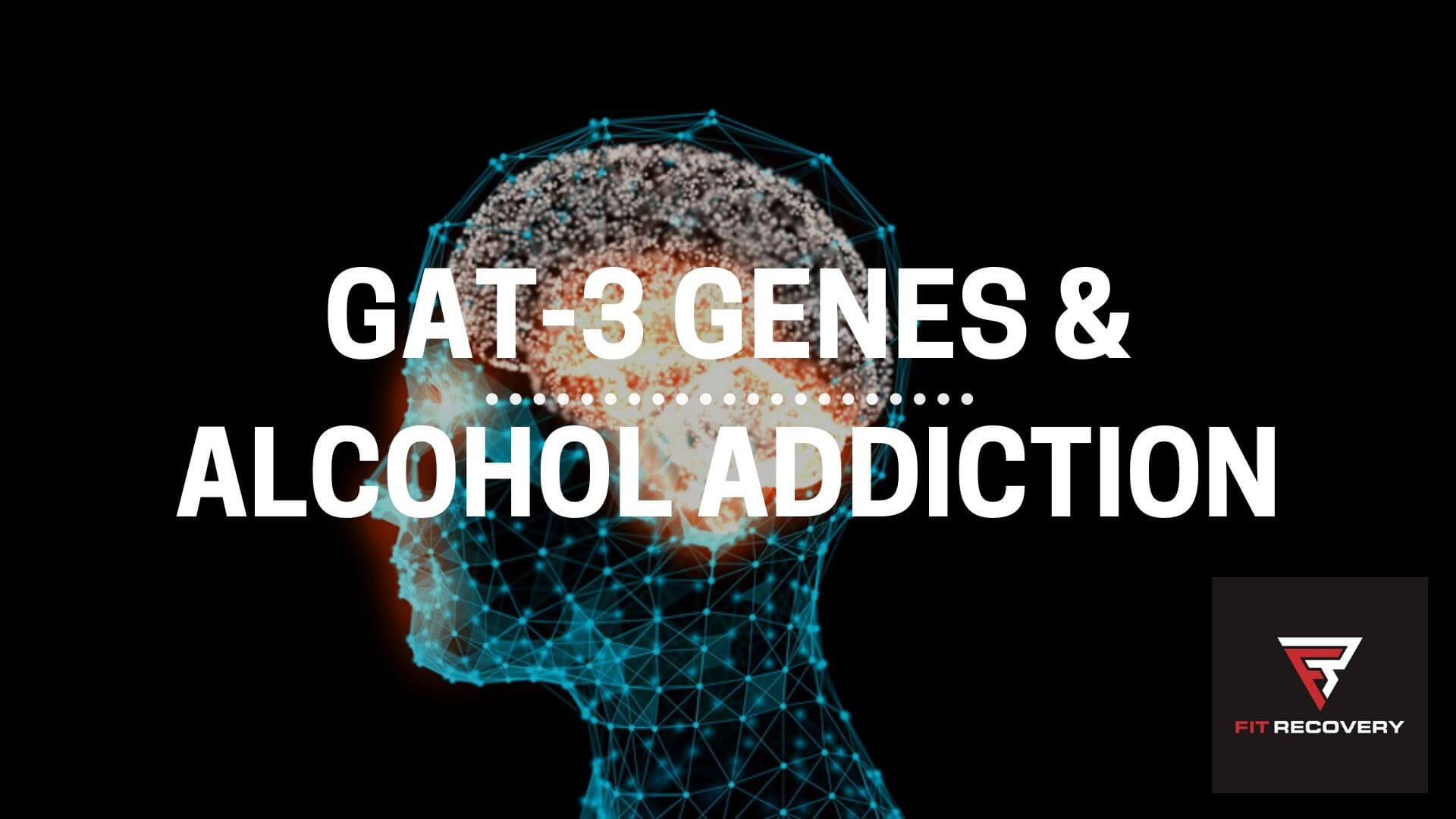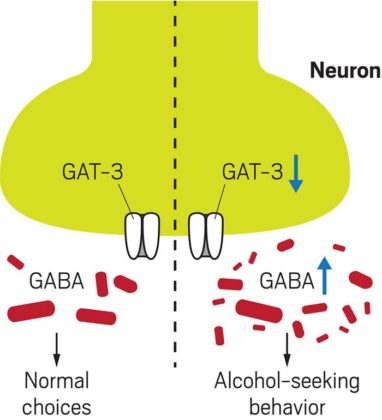
In this short video, I’m going to discuss the implications of a groundbreaking study on alcohol addiction that was published in June 2018.
This particular study identified a genetic anomaly shared by alcohol-dependent rats and humans. Furthermore, this anomaly was found to affect the brain’s regulation of a neurotransmitter known as GABA.
If you’ve been following Fit Recovery for some time, then you already know that I have a particular obsession with GABA. We need balanced GABA levels in order to feel relaxed and in control. Many people consume alcohol because it artificially stimulates GABA receptors. The study in question found that there is a specific protein, called GAT-3, that is:
- Involved in recycling GABA back into neurons in the amygdala (emotional center) after it is released
- Found to be ~50% depleted only in rats and humans who develop alcohol dependence
- Controlled by genes that can theoretically be manipulated
While this discovery is certainly not a cure for alcohol addiction, it is one giant step in the right direction! Identifying the genetic basis for alcohol addiction paves the way for an eventual cure, while also helping to extinguish the shame that people often feel for developing this biochemical disorder.
In the video below, I discuss this study in a bit more depth:
(Click here to watch the video on YouTube)
The Role Of GAT-3 In Alcohol Addiction
Here’s a bullet-style breakdown of the methods and findings involved in this study:
- Scientists took a sample of rats from different breeds and gave them a choice between sugar-water and alcohol.
- After testing more than 600 rats, 85% consistently chose sugar-water and 15% consistently chose the alcohol.
- (The percentage of humans who become dependent on alcohol is also 15%.)
- The alcohol-loving rats kept going for booze, even if they had to endure electric shocks and bitter tastes to get it!
- Scientists then compared the brains of the sugar-preferring rats and the alcohol-preferring rats.
- They found that the alcohol-preferring rats had no differences in brain regions associated with addiction except for 50% reduced GAT-3 gene expression in the amygdala.
- They then took sugar-preferring rats and engineered them to produce 50% less GAT-3, and these rats suddenly became prone to alcohol dependence!
- Finally, scientists compared the brains of deceased alcohol-dependent people with deceased normal people, and found that the former group had 50% less expression in genes that control GAT-3 levels.
As you can see, the implications of this study are profound. Another notable aspect of this study is its quality:
- A large sample size of rats (over 600) and diverse breeds were used to mitigate sample size errors.
- Unlike past studies that gave rats a choice between alcohol and water, this one provided an alternative reward in the form of sugar-water. Both sugar-water and alcohol activate dopamine reward circuitry, ensuring that the study’s findings would hinge on something besides the release of dopamine in response to a reward.
- The alcohol-dependent rats were forced to associate alcohol with electric shocks and bitter tastes, and they drank anyway. This situation recreates the phenomenon of human alcohol addiction, which usually involves the pursuit of alcohol despite negative consequences.
- The basic findings – decreased expression of GAT-3 genes – were mirrored in the brains of (deceased) humans.
The second and third points above are significant in my opinion. Nearly everyone experiences an artificial high from alcohol, but only alcohol-dependent people sacrifice alternative rewards AND endure self-torture in order to drink alcohol.
Beyond that, what exactly does it mean to have 50% less expression in genes that control GAT-3?
Low activity in GAT-3 means that GABA spends too much time in the space between brain cells, rather than being properly taken up into them. For reasons that still under scientific investigation, the GABA that is not recycled properly back into neurons is not able to perform its basic function of suppressing electrical activity and reducing anxiety.
My first impression upon seeing the above diagram was that alcohol-preferring rats (and people) might be experiencing paradoxical reactions from “too much” GABA.
Yet if this were the case, then why would their symptoms be relieved by alcohol and benzodiazepines, both of which mimic GABA and plug in to GABA receptors? It seems to me that for whatever reason, the GABA that is not being recycled by GAT-3 is simply not interacting properly with GABA receptors.
As with anything in neuroscience – and I am not a neuroscientist! – there could quite literally be a million reasons for this.
“But What Does This Study Mean For Me?”
Scientists are using this study to develop drugs that may work better than existing GABA-activating drugs, which currently include benzodiazepines and barbiturates. In the meantime, it’s best to experiment with strategies that help to organically normalize or enhance GABA function, such as nutrient repair and exercise.
I hope that the findings of this study will be scientifically investigated alongside other recent studies involving CBD oil and stem cells. Rats that were injected with either CBD oil or stems cells were found to recover from alcohol addiction for reasons that were not entirely understood, but which we know were related to reducing inflammation in certain regions of the brain.
Could it be the case that reducing systemic inflammation helps to compensate for this anomaly in GAT-3 gene expression?
I do not know the answer to this question. But I’m more excited about the prospects of CBD for alcohol addiction, as well as stem cell injections (not yet available for this purpose in the U.S.), than synthetic drugs that may not be invented for another 5-10 years.
Knowledge Is (Potential) Power
While further studies in humans are clearly needed, the main takeaway here is that people who develop alcohol dependence might have a common denominator even before they start drinking.
But it is not a vague spiritual defect – nor is it necessarily permanent.
Specifically, lower expression in GAT-3 genes appears to result in a particular affinity for alcohol.
Over time, this initial affinity for alcohol results in increased alcohol consumption, which ultimately depletes levels of many neurotransmitters and causes inflammation that damages every cell in the body.
It’s important to distinguish root causes from end results. Even if all alcohol addiction results from low GAT-3 gene expression – and even if a cure were to be developed that would prevent all future cases of alcohol addiction – people who have already developed alcohol addiction will still need to repair their bodies and brains.
Authors
-
Chris Scott founded Fit Recovery in 2014 to help people from around the world dominate alcohol dependence and rebuild their lives from scratch. A former investment banker, he recovered from alcohol dependence using cutting-edge methods that integrate nutrition, physiology, and behavioral change. Today, Chris is an Alcohol Recovery Coach and the creator of an online course called Total Alcohol Recovery 2.0.
View all posts -
Dr. Rebeca Eriksen is the Nutritional Consultant for Fit Recovery. She has a PhD in Nutritional Genetics from Imperial College London, and over ten years of clinical experience designing custom nutritional repair regimens for patients recovering from alcohol addiction. In addition to her work at the exclusive Executive Health clinic in Marbella, Spain, she helps to keep Fit Recovery up to date with emerging research.
View all posts










Hello, thank you for the article. How do you think, can Gaba supplements help? (e.g. Now Foods Gaba with vitamin B). Or Magnesium with vitamin B work better? Or L-glutamine is enough?
Hi Alexandra, it depends on the person because everyone is biochemically different. But all of these can definitely help! Intelligent experimentation is the best way to figure out what works for you.
This is a great tool to consider. Thank u scott…where are u located…I am in south fl
Thanks Eileen! I’m often traveling, but I spend a lot of time in GA.
The day after I tapered off alcohol, I started with kratom and CBD oil and it really work for me. I did not feel addicted to either and soon the need to handle the need to be high was helped by both of those substances and some of the other supplements.
Awesome, thank you for sharing this Kathy!
Great article. I don’t know in the us but here in the Netherlands bdc is freely availlable and not only the oil but also in capsules of 5 and 10mg. The question ls however what doses will be needed tp take effect and how long should it be used? It is not expensive and I would try it out but since it is not sold especialy against alcohol addiction the right doses is not written. Any suggestion please. Thanks.
Thanks Luc! I think effective dosage will vary from person to person, as with any other supplement or medication. My philosophy of supplementation is to discover a minimum effective dosage for me, try it out for a week or two, and increase if necessary. Let us know how it goes!